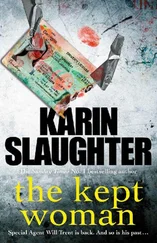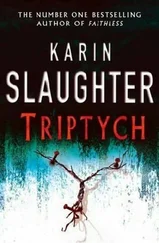Sara went right to work, carefully reading the next personnel file. Ben Humphrey had been the same kind of cop as Boyd Spivey: solidly built, good at his job, driven to get press, and, in the end, absolutely corrupt. The same proved to be true of Adam Hopkins and Demarcus Alexander, both of whom were praised for their bravery under fire during a bank robbery, both of whom paid cash for their vacation homes in Florida. Lloyd Crittenden had earned his shield after flipping his cruiser six times during the pursuit of a man who’d shot up a seedy bar with a sawed-off shotgun. He also had a mouth on him. There were two write-ups for insubordination, but Evelyn’s yearly reviews had been nothing if not glowing.
The only outlier was Chuck Finn, who seemed more cerebral than his colleagues. Finn had been in the process of earning his PhD in Italian renaissance art when he was busted. His lifestyle wasn’t as lavish as the others’. He’d used his ill-gotten gains to educate himself and travel the world. He must’ve complemented the team in more subtle ways. Evelyn Mitchell had obviously handpicked each man for a reason. Some were leaders. Some, like Chuck Finn, were obviously followers. They all fit the same general profile: overachievers with a reputation in the department for doing whatever had to be done. Three were white. Two were black. One was part Cherokee Indian. All of them had given up everything for cold, hard cash.
Will flipped over the tape in the Walkman. He sat with his eyes closed, headphones tucked into his ears. She could hear the squeak of the wheels working in the tape player.
The next stack of folders detailed all of the high-dollar busts the team had made, and presumably skimmed from, over the years. Sara had thought these files would be the hardest to get through, but they all turned out to be fairly mundane. Such was the nature of the illegal drug trade that most of the men the team had arrested were either dead or incarcerated when Evelyn’s squad was busted. Only a few were still on the street, but they were obviously active. Sara recognized some of the names from the nightly news. Two looked promising for their own reasons. She set their files aside for Will.
Sara checked the time. It was well past midnight and she had an early shift in the morning. As if on cue, her mouth opened in such a wide yawn that her jaw popped. She glanced at Will to make sure he hadn’t seen. There was still a large stack of folders in front of her. She was only halfway through, but she couldn’t make herself stop if she wanted to. It was like trying to put together all the clues in a mystery novel. The good guys were just as corrupt as the villains. The villains seemed to take the graft as a cost of doing business. Both probably had a long list of justifications for their illegal actions.
She tackled the next pile of folders. The six men on Evelyn’s team had never gone to trial, but they must have been close to starting when the deals were made. The prosecution’s list of potential witnesses had been highly screened, but no more so than those representing the defendants. The names would be familiar to Will, but still, Sara carefully read through each file. After a solid hour of comparing statements, she let herself move on to the last file, which she’d held back as a reward for not giving up.
Evelyn Mitchell’s booking photo showed a trim woman with an unreadable expression on her face. She must have felt humiliated to be booked and processed after spending so much time on the other side of the table. Nothing about her expression gave that away. Her mouth was set in a tight line. Her eyes stared blankly ahead. Her hair was blonde, like Faith’s, with gray streaking through at the temples. Blue eyes, 138 pounds, five-nine—a little taller than her daughter.
Her career was the sort that garnered pioneer awards from the local Women’s Club, which Captain Mitchell had twice received. Her promotion to detective was preceded by a hostage negotiation that had resulted in the freeing of two children and the death of a serial child molester. Her lieutenant rank came almost ten years after passing the test with the highest grade yet recorded. Her captainship was the result of a gender-bias lawsuit filed with the EEOC.
Evelyn had worked her way up the hard way, paying her dues on the street. She had two degrees, one from Georgia Tech, both with honors. She was a mother, a grandmother, a widow. Her children were in what Sara thought of as service—one to her community, the other to his country. Her husband had worked a solidly respectable job as an insurance salesman. In many ways, she reminded Sara of her own mother. Cathy Linton wasn’t the sort of woman to carry a gun, but she was driven to do what she believed was right for herself and her family.
But she would’ve never taken a bribe. Cathy was painfully honest, the sort of person who would turn around and drive fifty miles back to a tourist trap in Florida because they had given her too much change. Maybe this explained why Faith could work with Will. If someone had told Sara that her mother had stolen almost a million dollars, she would’ve laughed in their face. It was the stuff of fairy tales. Faith didn’t just think he was wrong about her mother. She thought he was deluded.
Will changed out another tape.
Sara motioned for him to take off his headphones. “It doesn’t add up.”
“What doesn’t?”
“You said each team member netted just shy of a million dollars. You’ve accounted for sixty thousand, at best, in the out-of-state account that was opened in Bill Mitchell’s name. Evelyn doesn’t drive a Porsche. She doesn’t have a mistress. Faith and her brother weren’t in private schools, and the only vacations she took were to Jekyll Island with her grandson.”
“It adds up after today,” he reminded her. “Whoever took Evelyn wants that money.”
“I don’t buy it.”
Most cops defended their cases like they would defend their children. Will just asked, “Why?”
“Gut feeling. Instinct. I just don’t buy it.”
“Faith doesn’t know about the bank account.”
“I won’t tell her.”
He sat up, clasping his hands together. “I’ve been listening to my early interviews with Evelyn. She talks about her husband, mostly.”
“Bill, right? He was an insurance agent.”
“He died a few years before the case was brought against Evelyn.”
Sara braced herself for a widow question, but Will went in another direction.
“The year before Bill died, he was sued by the family of a policyholder for a claim denial. They said Bill filled out some paperwork incorrectly. A father of three had a rare kind of heart defect. The company denied treatment.”
This wasn’t a new story to Sara. “They said it was a pre-existing condition.”
“Only it wasn’t—at least not diagnosed. The family got a lawyer, but it was too late. The guy ended up dying because the wrong box was checked on a form. Three days later, his widow gets a letter in the mail from the insurance company saying that Bill Mitchell, the originating agent, made a mistake on the forms and her husband’s treatment was approved.”
“That’s awful.”
“Bill took it hard. He was a very careful man. His reputation was important to him, important to his work. He got an ulcer worrying about it.”
That wasn’t technically how ulcers worked, but she told him, “Go on.”
“He was eventually cleared. They found the original forms. The insurance company had screwed up, not Bill. Some data entry person had clicked the wrong box. No malfeasance, just incompetence.” Will waved this away. “Anyway, what Evelyn said was that Bill never got past it. It made her crazy because he wouldn’t let it go. They argued about it. She thought he was just feeling sorry for himself. She accused him of being paranoid. He said people at work treated him differently. A lot of people thought the company took the bullet and it was really Bill’s mistake.”
Читать дальше












